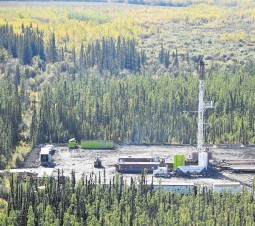
As much as 400,000 barrels a day of oil production is at risk as US shale companies like Samson Resources run out of money and are forced to slow drilling.
Total debt for half of the companies in a Bloomberg index of more than 60 producers has risen to a level that represents 40% of their enterprise value. It’s a sign of distress that shows equity values falling in the face of oil’s crash, said Rob Thummel, a managing director and portfolio manager at Tortoise Capital Advisors LLC who helps manage $15.6billion.
The companies facing high debt loads, which include Encana and Chesapeake Energy, produced 1.1 million barrels of oil a day in the second quarter of this year, according to data compiled by Bloomberg.
If more companies file for bankruptcy as Samson did Wednesday, or embrace the kinds of draconian cuts needed to survive, output could fall by 200,000 to 400,000 barrels, Thummel said.
Oklahoma, the sixth-largest producing state, pumped 356,000 barrels a day in June, government data show.
“We are going to see a major response because these financially challenged companies won’t be able to produce as much as they did in the past,” he said.
As companies run low on cash, they may be forced to idle drilling rigs, confront bankruptcy or seek more-expensive financing and sell assets.
Producers who hoped for a price rebound later this year have so far been disappointed.
US oil futures fell to $46.90 yesterday in New York, down by half in the past year. A glut of crude may keep oil prices low for the next 15 years, according to Goldman Sachs Group Inc.
Most shale companies can’t make money at Goldman’s $50 price forecast. With less demand now from investors for new shares or debt, producers face a handful of grim choices. Those that opt for bankruptcy or debt restructuring are likely to slow drilling, said Marc Schwartz, a partner at consultant HSSK LLC who works on energy bankruptcy and debt deals.
“The wells that are producing will keep producing because they can still sell the oil for more than it costs to shut them in,” he said. “But in the shale plays, which need constant new drilling to keep output high, some production will dry up because of the capital cost of going out and producing more.”
In many cases, new wells won’t get drilled until restructuring is complete, he said.
In the case of Samson, which was acquired by private equity firm KKR & Co. and other investors in 2012 for $7.2billion, the company expects no new drilling this year.
Production, which is mostly natural gas, would fall by 7% this year, then 30% in 2016, and then an additional 20% in the next year, according to company filings.
“A lot of investors earlier in the year thought they would do well by coming into the market, but then there was a double dip in prices,” said William Arnold, a former executive at Royal Dutch Shell Plc who teaches at Rice University in Houston.
“It’s going to be a very tough time for these struggling companies.”
Recommended for you
